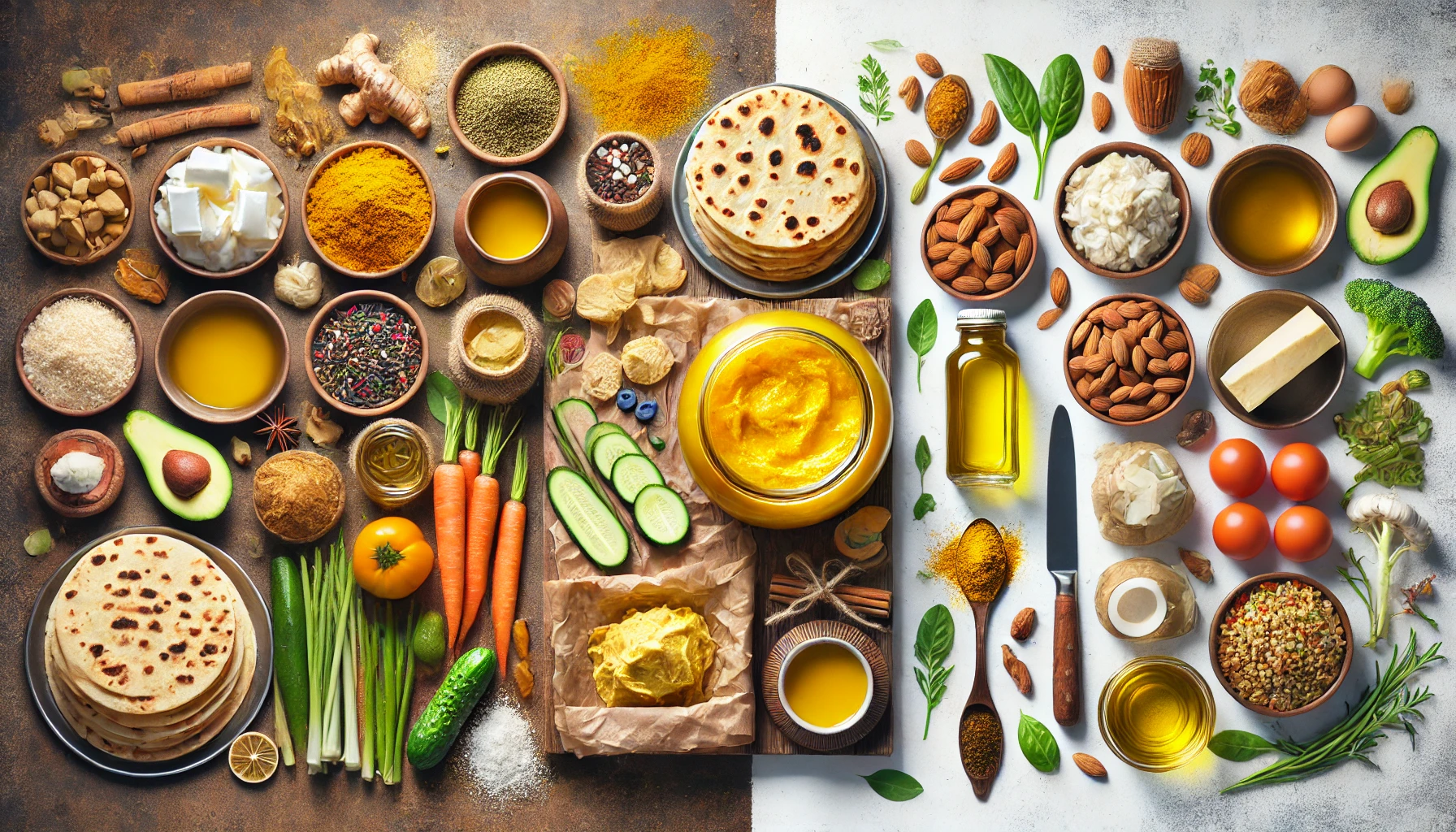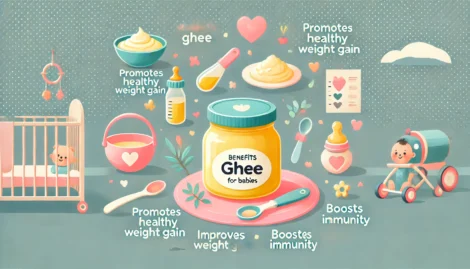- You have no items in your shopping cart
- Subtotal: ₹0.00

Veganism vs. Ghee: Are You Missing Out on Health Benefits?
In recent years, the popularity of veganism has soared, with more people opting for plant-based diets for ethical, environmental, and health reasons. One food that is often avoided by vegans is ghee, a type of clarified butter that has been used in Indian cooking for thousands of years. Ghee is derived from animal milk, typically from cows, and for that reason, it is off-limits for those who follow a strict vegan diet.
However, as the vegan movement gains momentum, there are some myths and misconceptions about ghee that deserve a closer look. While many vegans avoid ghee due to its animal origins, it’s important to explore whether avoiding ghee is truly necessary from an ethical or health standpoint. Additionally, some traditional practices of producing ghee—particularly desi cow ghee sourced humanely—offer compelling reasons why it may not fit into the typical criticisms of animal-based foods.
In this blog post, we’ll delve into common vegan myths about ghee, explore its health benefits, and question whether avoiding it is as clear-cut as it seems. We’ll also investigate whether ghee can be considered a sustainable and ethical choice when sourced responsibly, making the case for its inclusion in a balanced diet.
What is Ghee?
Ghee is a form of clarified butter that has been traditionally used in Indian cuisine, Ayurveda, and religious rituals for centuries. It is made by simmering butter to separate the milk solids from the pure butterfat, which results in a golden, aromatic liquid that is prized for its flavor and medicinal properties. The process of making ghee removes most of the lactose and casein, making it suitable for those with dairy sensitivities.
Ghee is incredibly versatile and has a high smoke point, making it ideal for cooking at high temperatures. It’s also packed with essential fatty acids, vitamins, and antioxidants that make it a health-boosting ingredient in moderation. In traditional Indian households, ghee is considered a superfood that promotes overall well-being.
Vegan Myth #1: Ghee is Unhealthy Because It Comes from Animal Fat
One of the most common misconceptions surrounding ghee is that it is unhealthy because it comes from animal fat. Many vegans avoid animal products altogether due to the belief that they contribute to heart disease, obesity, and other health issues. However, research shows that not all fats are created equal.
Ghee is rich in healthy fats like omega-3 fatty acids and conjugated linoleic acid (CLA), both of which have been linked to numerous health benefits, including improved heart health and reduced inflammation. Ghee is also a source of fat-soluble vitamins like A, D, E, and K, which are essential for maintaining strong bones, healthy skin, and a robust immune system.
A study published in the Journal of Clinical Lipidology found that moderate consumption of ghee did not raise cholesterol levels or increase the risk of heart disease. In fact, some studies suggest that ghee can even help regulate cholesterol levels by increasing HDL (good cholesterol) while reducing LDL (bad cholesterol). This makes ghee a healthy fat when consumed in moderation.
Vegan Myth #2: Ghee is Harmful to the Environment
Many vegans avoid animal products because of concerns about their environmental impact, particularly the high carbon footprint associated with animal agriculture. While it’s true that industrial-scale animal farming can have devastating environmental effects, the production of desi cow ghee, when done sustainably and ethically, is not necessarily harmful to the environment.
Desi cows, particularly the indigenous breeds found in India, are often raised on small, local farms where they are allowed to graze freely and are not subjected to the harsh conditions of factory farming. These cows produce A2 milk, which is then used to make ghee. A2 milk is considered to be more easily digestible and is often preferred for its health benefits over A1 milk, which is commonly produced by cows in industrial farming settings.
Additionally, some farms practice regenerative agriculture, a farming method that focuses on restoring soil health, improving biodiversity, and reducing the overall environmental impact of farming. By supporting small farms that raise cows humanely and focus on sustainability, consumers can enjoy the benefits of ghee without contributing to the negative environmental impacts often associated with large-scale dairy farming.
Vegan Myth #3: Ghee is Not Ethical Because It Comes from Animals
For many vegans, the ethical argument against ghee is rooted in the fact that it is derived from animals, specifically cows. However, the ethical considerations surrounding ghee production can vary depending on the source.
The production of desi cow ghee, for example, often involves cows that are treated with care and respect. In many traditional Indian households, cows are considered sacred animals, and their milk is viewed as a gift. These cows are typically allowed to graze freely, and they are not subjected to the same inhumane practices seen in factory farming. Some farms even go as far as allowing cows to live out their natural lives without being slaughtered for meat.
It’s also worth noting that ghee can be made from milk that is ethically sourced, meaning the cows are not subjected to unnecessary harm or exploitation. By choosing ghee from reputable sources that prioritize animal welfare, consumers can make a more ethical choice without completely forgoing the health benefits of ghee.
The Health Benefits of Ghee: Why Vegans May Be Missing Out
While the ethical and environmental arguments against ghee are often the primary reasons why vegans avoid it, the health benefits of ghee cannot be overlooked. Here are some of the key reasons why ghee is considered a superfood and why avoiding it may mean missing out on some significant health advantages:
1. Ghee is Packed with Healthy Fats
As mentioned earlier, ghee is a rich source of healthy fats, including omega-3 fatty acids and CLA. These fats play a crucial role in promoting heart health, reducing inflammation, and supporting brain function. Omega-3 fatty acids, in particular, have been shown to reduce the risk of heart disease and improve cognitive health.
In contrast, many vegan diets rely heavily on processed vegetable oils, which are often high in omega-6 fatty acids. While omega-6 fatty acids are essential for the body, an imbalance between omega-3 and omega-6 can lead to inflammation and other health issues. Ghee provides a balanced source of fats that are beneficial for overall health.
2. Ghee is a Natural Source of Fat-Soluble Vitamins
Fat-soluble vitamins like vitamin A, vitamin D, vitamin E, and vitamin K are essential for maintaining healthy bones, skin, and immune function. These vitamins are best absorbed by the body when consumed with fat, making ghee an excellent vehicle for delivering these nutrients.
In particular, vitamin K2, which is found in ghee, plays a crucial role in bone health and helps prevent calcium buildup in the arteries, reducing the risk of heart disease. For vegans who avoid ghee, it can be challenging to obtain adequate amounts of these fat-soluble vitamins through plant-based sources alone.
3. Ghee Supports Gut Health
Ghee is rich in butyric acid, a short-chain fatty acid that has been shown to support gut health by reducing inflammation in the digestive tract and promoting the growth of beneficial gut bacteria. Butyric acid also helps improve digestion and can aid in the treatment of conditions like irritable bowel syndrome (IBS) and ulcerative colitis.
In Ayurveda, ghee has long been used as a remedy for digestive issues, and modern research supports its role in promoting a healthy gut. For vegans who may struggle with digestive problems, incorporating ghee into their diet could offer significant relief.
4. Ghee is Lactose-Free
One of the reasons why some people avoid dairy products is due to lactose intolerance, which can cause bloating, gas, and other digestive discomforts. However, ghee is naturally lactose-free because the milk solids (which contain lactose) are removed during the clarification process. This makes ghee a suitable option for those with lactose intolerance who still want to enjoy the health benefits of dairy.
Can Ghee Be Sustainable?
Sustainability is a major concern for vegans and non-vegans alike. While industrial dairy farming has been widely criticized for its environmental impact, the production of desi cow ghee can be done sustainably.
Desi cows, which are indigenous to India, are often raised on small, local farms that use traditional farming methods. These farms prioritize the well-being of the cows and the health of the land, often practicing regenerative agriculture. This type of farming focuses on improving soil health, increasing biodiversity, and reducing carbon emissions.
Additionally, desi cows are known for producing A2 milk, which is easier to digest and contains higher levels of beneficial nutrients compared to A1 milk. By choosing ghee made from A2 milk, consumers can support more sustainable farming practices while also reaping the health benefits of ghee.
Conclusion: Should Vegans Reconsider Ghee?
The debate over whether ghee should be included in a vegan diet is not a simple one. While ghee is derived from animals, there are ethical and sustainable ways to source ghee that align with many of the values held by vegans, particularly those concerned with animal welfare and environmental impact.
From a health perspective, ghee offers a range of benefits that are difficult to obtain from plant-based sources alone, including healthy fats, fat-soluble vitamins, and gut-supporting butyric acid. By avoiding ghee, vegans may be missing out on these important nutrients.
Ultimately, the decision to include ghee in a vegan diet is a personal one. However, it’s clear that ghee can be a healthy, sustainable, and ethical choice when sourced responsibly.
For those who are open to incorporating ghee into their diet, GheeStore offers a wide range of pure, desi cow ghee products that are sourced from ethically raised cows. Our ghee is produced using traditional methods to ensure the highest quality and nutritional value. Make the switch to GheeStore ghee today and experience the health benefits for yourself.



